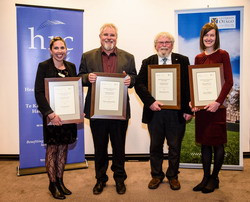A world-renowned New Zealand longitudinal study researcher; a molecular science pioneer and mentor; and two talented up-and-coming researchers from the University of Otago have received Health Research Council of New Zealand (HRC) awards for an outstanding contribution to health research excellence, leadership, and impact this evening.
The awards were presented by HRC Board members Professor Jeroen Douwes and Ms Suzanne Snively, ONZM, at the University of Otago’s annual winter lecture hosted by the National List MP for Dunedin, the Hon. Michael Woodhouse.
Experienced health researchers Professors Richie Poulton and Warren Tate, and emerging researchers Associate Professor Suetonia Palmer and Dr Emma Wyeth were presented with their Celebrating Research Excellence Awards as part of the HRC’s 25-year anniversary celebrations.
Acting HRC Chief Executive Dr Tania Pocock says the HRC is immensely proud to recognise such high calibre researchers in this way.
“We wanted to celebrate the fantastic health researchers that we have here in New Zealand. Their work is making a real difference to the health and well-being of our people and contributing greatly to advances in global health research efforts.”
This is the second of a series of events organised by New Zealand’s leading institutions that the HRC is partnering with this year to celebrate health research.
The first established researcher award recipient, Professor Richie Poulton, has spearheaded one of the most detailed studies of human health and development ever undertaken. As director of the Dunedin longitudinal study, the impact of his research has been immense, both in New Zealand and internationally. The Dunedin Study has been largely funded by the HRC and its predecessor for more than 40 years, with interim funding from the Ministry of Business, Innovation and Employment in 2015/2016, and has attracted support from US and UK funders who have seen the work as very valuable.
Being able to predict adult measures of well-being from childhood measures of self-control, determining the effects of early cannabis use on cognitive decline in adulthood, and uncovering the effects of psychosocial distress on telomere erosion and the pace of aging are just a few of the achievements of the Dunedin Study, which is currently the focus of the TVNZ documentary Why am I?
Professor Warren Tate, who also received a HRC established researcher award, first became involved in HRC-funded research in 1977. His work is widely recognised to have revolutionised our understanding of how proteins are synthesised in living cells, and provided important insights into the mechanisms behind diseases as diverse as Alzheimer’s, HIV and chronic fatigue syndrome.
Throughout his career Professor Tate has mentored more than 100 graduate students, many of whom have gone on to have successful research careers of their own. Public service, especially in the interests of science, has also been a feature of his distinguished career.
The first emerging researcher award recipient, Christchurch-based kidney specialist Associate Professor Suetonia Palmer, has gone from being a HRC clinical research training fellow to an internationally recognised and cited researcher in identifying the best and safest treatments for kidney disease and diabetes in less than a decade.
Dr Palmer’s innovative work with chronic kidney disease patients saw her become the first New Zealander to win a L’Oréal UNESCO Australia and New Zealand for Women in Science Fellowship. She has since received a HRC emerging researcher first grant, and secured a Rutherford Discovery Fellowship for five years. Continuing her impressive career progression, last year she also received a HRC project grant where she is involved in a large bi-national clinical trial with the Australasian Kidney Trials Network.
The second emerging researcher award recipient, Dr Emma Wyeth, is an excellent example of a young researcher who has flourished as a result of opportunities offered by the HRC.
A recipient of a HRC Māori Health PhD Scholarship, she went on to become a HRC Eru Pōmare Post-Doctoral Research Fellow, and in 2014 was awarded a HRC Emerging Researcher First Grant for her project to reduce the burden of disability for injured Māori.
Dr Wyeth’s outstanding research capabilities are matched by her recognised leadership qualities. She’s director of the Ngāi Tahu Māori Health Research Unit at the University of Otago and just this year was appointed co-deputy director and a principal investigator of the Māori Health Centre of Research Excellence, Ngā Pae o te Māramatanga.
